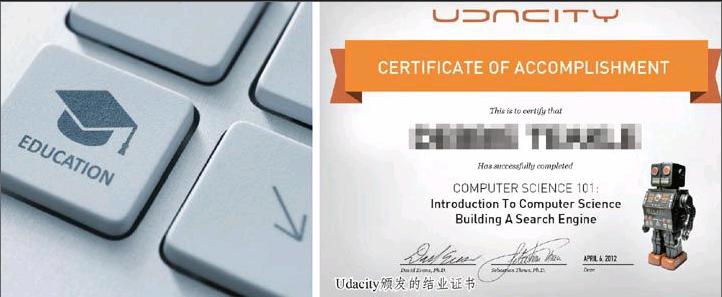在线教育的漫漫成功路
文/Selena+Larson+译/Cecilia+Wei



I am currently enrolled in a free online Coursera1) class on terrorism through a university located in the Netherlands, in which I watch lectures and complete assignments from the comfort of my couch. As much as I enjoy the subject matter, though, completing the course in a timely fashion2) while maintaining a work-life balance has proven challenging.
I almost gave it up.
Instead of quitting altogether, I paid Coursera $49 to give me a “completion certificate” so Ill have a reward when I complete the course. Putting actual money on the line3) turned out to be all the incentive I needed to keep going.
Online education services like Udacity4) and Coursera bank on5) students like me to drive them to success. And if recent online course offerings are any indication, this year we might start to see a trend towards legitimacy and profitability that proves open education has staying power among the multitasking masses.
2013 proved to be a banner year6) for online education. Massive open online courses, sometimes called MOOCs, surged in popularity, due to advanced offerings and a promise to make university-level education accessible. But these companies also faced considerable scrutiny.
In attempting to disrupt traditional education and become a standard of online learning, MOOCs suffered very low retention and completion rates as well as skepticism surrounding their business models. Coursera, one of the most popular online education companies, averaged a retention rate of just four percent across all courses, according to Coursera cofounder Daphne Koller.
It appears education companies are ready to tackle low retention rates and carve out7) their niches8) in academia. With a few subtle changes, these startups could prove to the naysayers that online education is not only affordable, but also attractive to students and employers alike.
A Move to Legitimize
Coursera recently introduced “specialization certificates,” which awards students with certificates once they master a sequence of courses on a specific topic and complete a capstone9) (a.k.a. “senior”) project.
In an interview with ReadWrite10), Andrew Ng, cofounder and co-CEO of Coursera, said the goal of specialization certificates is to provide more meaningful credentials by putting together11) a full course of study.
Initially, the specialization certificate courses will focus on areas where jobs are in high-demand and could help students secure employment opportunities. For instance, a specialization in data science offered by Johns Hopkins University consists of nine courses, and a Virtual Teacher Program with the University of California at Irvine can be completed in just four courses.
In order to achieve a specialization certificate, students must pay a fee per course to receive verified certificates, which Ng says will drastically improve completion rates.
“We do believe doing a capstone project and earning a specialization certificate will provide greater incentive and motivation for students to complete,” he said.
In initial user tests surrounding the proposed specialization certificate program, Coursera found that introducing a capstone project increased students interest in completing the series of courses by 50 percent.
With Coursera, students can take a course for free or pay anywhere from $49 to $100 for a verified certificate through its Signature Track12) program. Ng said the completion rate for students who paid for courses to earn verified certificates was 63%—considerably higher than the average completion rate.
The majority of courses on Coursera and other online education services can be taken for free, though paid tiers13) offer more in-depth study, and in Courseras case, a more legitimate completion certificate.
On Udacity, another MOOC website, non-paying students have access to course videos and exercises and can view and manage their progress, but a paid subscription gives them access to in-class projects, feedback from instructors and a verified certificate.
Udacity takes a different approach to providing students with desirable classes or skills: The company teamed up with14) corporations including Cloudera15) and Salesforce16) to create industry-specific classes that allow students to achieve certificates recognized by the Open Education Alliance, a partnership between leading technology companies to further the education and adoption of technical skills.
Dont Call It a Major
When comparing a traditional college education to online-only programs, the new specialization certificates could be considered Courseras version of a degree. But Ng said thats not the way it was intended.
“Seventy-five percent of Coursera students today already have a degree,” he said. “We hope to see that these will be a complement to a degree.”
While Coursera is making a distinction between its services and brick-and-mortar17) universities, Udacity, Georgia Tech18), and AT&T19) have jointly developed an online masters degree in computer science that gives students an accredited20) university degree online for 20% less than on-campus tuition.
The worlds first massive online degree program started on January 15; nearly 2,400 people applied for the program, but only 375 students were accepted.
This isnt Udacitys first attempt to make its courses available to university students for credit. Last year, the company offered three online math classes to students at San Jose State University, but more students failed the online classes than students who took those courses in traditional settings.
Udacity is trying again with Georgia Tech. Depending on how well the program does, it could pave the way for more universities to partner with MOOCs and provide less-expensive degree programs to a larger audience.
The Tune Has Changed
Initially, founders of the MOOC movement—as well as proponents for free and open online education—heralded their creations as the next great education disrupter, a way for people who cant go to college to attain an inexpensive education.
Sebastian Thrun, founder of Udacity, a well-known Stanford academic and founder of the secretive Google X research lab21), largely ignored the initial statistics that proved a free, open online education might not be the future of learning after all. In some instances, Udacity courses have up to a 90% dropout rate, but that didnt stop the charismatic founder from touting the platforms successes.
Thrun has since admitted he may have been wrong. In a recent interview for Fast Company22), he said Udacity may not be fulfilling the goal of a complete education experience. He also said he doesnt even like the term “MOOC.”
“We were on the front pages of newspapers and magazines, and at the same time, I was realizing, we dont educate people as others wished, or as I wished. We have a lousy23) product.”
Students echo similar opinions.
Nathan Winn, a sales account manager in San Francisco, has signed up for and not completed three Coursera classes. Winn told me he thought the courses were interesting, but didnt provide the enrichment he was looking for.
Instead, he took a $600 course through Berkeley Extension, a continuing education branch of the University of California at Berkeley.
He said relying on the resources at Cal and investing a large sum of money encouraged him to complete the course. “It was expensive, but because I put that much money into it, I totally completed it.”
An Education Will Cost Money, Perhaps Just Not as Much
Open online educational companies are still experimenting to find the perfect model—one that benefits students, educators and the companies alike.
Legitimacy costs money. Its why traditional colleges and universities often charge exorbitant24) sums so you can receive a diploma with the institutions name on it.
If the recent efforts from Coursera and Udacity are any indication, a completely free education and certification will never be available, but as the price of admission increases, so might the promise of a complete, and authentic, online education.
目前,我在Coursera平台上注册了一门关于恐怖主义的免费在线课程,该课程由荷兰一所大学提供。我舒舒服服地待在自家沙发上就能听讲座并完成作业。尽管我很喜欢这个主题,但事实证明,在保持工作与生活平衡的同时,及时完成课程是个挑战。
我差点放弃了这门课程。
但我没有完全放弃,而是向Coursera支付了49美元,好让其给我颁发一份“结业证”,这样我在完成课程时就能获得回报。害怕实实在在的钱会打水漂最终成了我继续学业所需的唯一动力。
Udacity和Coursera等在线教育服务平台指望我这样的学生来推动他们获得成功。而从最近推出的在线课程来看,今年我们可能会开始发现,开放教育正呈现出向正规化及营利性方向发展的趋势,这证明开放教育在“分身有术”的人群中仍具有持久力。
事实证明,2013年是在线教育的兴旺年。由于其提供高水平的课程并承诺普及大学水平的教育,大规模在线开放课程(有时被简称为“慕课”)突然大受欢迎。但这些公司也面临着细细的审视。
在其试图颠覆传统教育、成为在线学习标杆的过程中,慕课遇到了学生保留率和课程完成率极低的问题,其经营模式也受到了质疑。Coursera是最受欢迎的在线教育公司之一,据该公司的联合创始人达芙妮·科勒称,公司所有课程的平均保留率仅为4%。
各个教育公司似乎准备好要解决低保留率问题,并准备在学术界中闯出一片自己的天地。通过一些微妙的改变,这些新兴公司可以向反对者证明在线教育不仅价格让人能够接受,而且对学生和雇主都具有吸引力。
向正规化迈进
Coursera最近推出了“专项认证证书”。一旦学生掌握了关于某个具体主题的一系列课程,并完成一项顶点(即“高年级”)项目,Coursera就会授予学生该证书。
在接受读写网采访时,Coursera的联合创始人、联合首席执行官吴恩达表示,推出专项认证证书的目的是要通过打造一套完整的学习课程来提供更有意义的资格证书。
一开始,专项认证证书课程将主要针对那些岗位需求旺盛的领域,并能帮助学生获得就业机会。例如,约翰·霍普金斯大学提供的数据科学专项课程包括九门课,而加州大学欧文分校的虚拟教师项目仅需完成四门课即可结业。
为了获得专项认证证书,学生们必须为每门课程付费以获得认证证书。吴恩达称这一举措将显著提高完成率。
“我们的确认为,完成一个顶点项目并获得一张专项认证证书将为学生完成课程带来更强的激励和动力。”他说。
Coursera就其计划推出的专项认证证书项目开展了初步用户测试,发现顶点项目的推出使学生完成系列课程的兴趣提高了50%。
在Coursera学习,学生们可以免费学习课程,或是通过该平台的签名认证项目支付49~100美元不等的金额以获得一张认证证书。吴恩达称,那些为课程付费以获得认证证书的学生的完成率为63%——比平台的平均完成率高出很多。
Coursera及其他在线教育服务平台上的大多数课程都可以免费学习,但付费级的课程会提供更深入的学习体验,而在Coursera,付费级课程会提供一张更正规的结业证书。
在另一个慕课网站Udacity上,没有付费的学生能够观看课程视频和做练习,还能查看和管理自己的学习进度,而付费订购则能让他们参与课上项目,获得老师的反馈,并得到一张认证证书。
Udacity采用一种不同的方式来为学生提供理想的课程或技能:该公司与Cloudera和Salesforce等企业合作,开设行业特定课程,使学生能够获得开放教育同盟认可的证书。开放教育同盟是各大顶尖技术公司为促进技术技能的教育和采用而组建的合作机构。
与专业课区分
在拿传统大学教育与只能在线学习的项目作比较时,新的专项认证证书可以被视为Cousera版本的学位,但吴恩达称这并不是推出该证书的目的。
“目前Coursera的学生中有75%已经拥有学位,”他说,“我们希望这些证书将成为学位的补充。”
Coursera正在将自己的服务同传统的实体大学区分开来,而Udacity、佐治亚理工学院和美国电话电报公司却已经联合开发了一个计算机科学硕士学位在线项目,让学生能够在线获得官方认可的大学学位,其学费要比在校学习的学费低20%。
这是世界首个大规模在线学位项目,于1月15日启动;有近2400人申请学习该项目,但其仅招收了375名学生。
这并不是Udacity首次尝试向大学生提供能计入学分的课程。去年,该公司向圣何塞州立大学的学生提供了三门在线数学课程,但与在传统环境中学习这些课程的学生相比,学习在线课程的学生中有更多人没能及格。
Udacity正与佐治亚理工学院合作,再次进行尝试。它可能会为更多大学与慕课平台进行合作铺平道路,并能为更广泛的受众提供花费更低的学位项目,不过这得看该项目进行得有多好。
并非一直受欢迎
起初,慕课运动的创始人——以及免费在线开放教育的倡导者——将自己的创造宣告为下一个伟大的教育颠覆者,是一个让无法上大学的人们获得较为划算的教育的途径。
Udacity的创始人塞巴斯蒂安·斯朗是斯坦福大学的一位著名学者以及秘密的谷歌X实验室的创始人。初步统计曾表明,免费在线开放教育可能根本不是学习的未来,但斯朗基本对此置之不理。在某些情况下,Udacity课程的弃课率高达90%,但这并未阻止这位充满魅力的创始人宣扬该平台的成功。
后来斯朗承认他以前可能错了。在最近接受《快公司》采访时他说,Udacity可能无法实现提供完整教育体验的目标。他还说他甚至不喜欢“慕课”这个字眼。
“我们上了各种报纸和杂志的头版,但与此同时我认识到,我们为人们提供的教育并不像他人所期待的那样,或者说不像我期待的那样,我们的产品很糟糕。”
学生们也表达了类似的看法。
内森·温是旧金山的一位销售客户经理,他报名参加了Coursera的三门课,但都没有完成。温告诉我,他觉得这些课程很有趣,但却没有他所期望的那么丰富。
他转而通过伯克利继续教育学院——加州大学伯克利分校的继续教育分支机构——修读了一门学费为600美元的课程。
他说借助加州大学的资源并投入一大笔钱能激励他完成课程。“学费很贵,但由于我为它花了这么多钱,我完完整整地修完了课程。”
还是要花些钱
在线开放教育公司仍在试验以找到完美的模式——一种令学生、教育工作者和企业同时受益的模式。
走向正规化是有成本的。这就是为什么传统学院和大学往往收取过高的费用,以便让你能够得到一张印有该机构名称的文凭。
Coursera和Udacity近期的努力表明,世上永远不会有完全免费的教育和证书,但随着入学费用的增长,完整而名副其实的在线教育可能会有望出现。
1. Coursera:一个提供免费公开在线课程的教育公司,由美国斯坦福大学两名计算机科学教授吴恩达(Andrew Ng)和达芙妮·科勒(Daphne Koller)联合创办,旨在同世界顶尖大学合作,在线提供免费的网络公开课程。
2. fashion [?f??(?)n] n. 方式;方法
3. put sth. on the line:使……处于危险之中;将……置于危险境地
4. Udacity:美国一家在线教育公司,总部位于加州帕洛阿尔托。
5. bank on:指望,依靠
6. banner year:丰收年,好年景
7. carve out:成功开创(事业);努力赢得(工作机会、合适的职位等)
8. niche [ni??] n. (对某人来说)适当的位置;合适的职位
9. capstone [?k?p?st??n] n. (尤指成就的)顶峰,顶点
10. ReadWrite:读写网,美国一家科技博客网站
11. put together:设计,创造,制订(协议、计划或产品)
12. Signature Track:签名认证,Coursera推出的一项收费认证服务,主要用于认证学习者的身份,以证明课程由本人完成。
13. tier [t??(r)] n. (组织或系统的)层;级
14. team up with:与……组队;与……协作
15. Cloudera:美国一家大数据软件创业公司,是云计算服务提供商。
16. Salesforce:美国一家客户关系管理(CRM)软件服务提供商
17. brick-and-mortar:(传统)实体的
18. Georgia Tech:佐治亚理工学院的英文简称,全称为Georgia Institute of Technology,是美国顶尖的理工学院。
19. AT&T:美国电话电报公司,是美国最大的本地和长途电话公司。
20. accredited [??kred?t?d] adj. 经官方认可(或承认)的
21. Google X research lab:谷歌X实验室,是谷歌最神秘的一个部门,位于旧金山,其机密程度堪比CIA,曾开发过谷歌眼镜和无人驾驶汽车等项目。
22. Fast Company:《快公司》,美国最具影响力的商业杂志之一
23. lousy [?la?zi] adj. 糟糕的;劣等的
24. exorbitant [?ɡ?z??(r)b?t?nt] adj. 索价过高的;过分的

